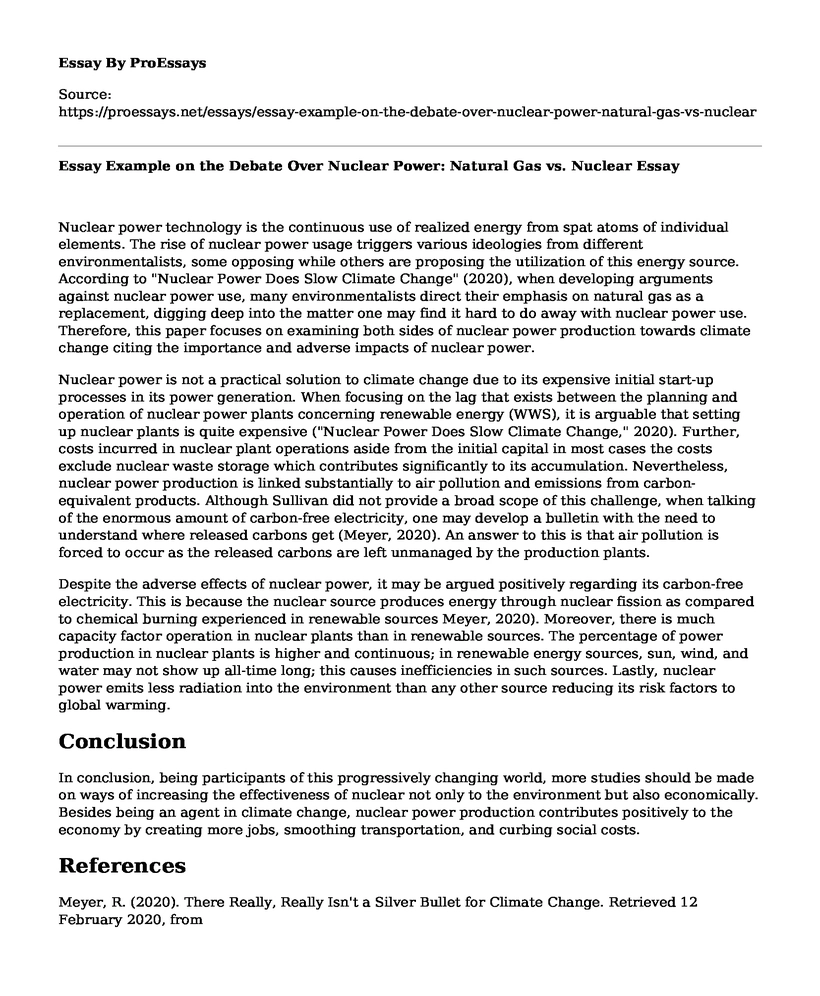Nuclear power technology is the continuous use of realized energy from spat atoms of individual elements. The rise of nuclear power usage triggers various ideologies from different environmentalists, some opposing while others are proposing the utilization of this energy source. According to "Nuclear Power Does Slow Climate Change" (2020), when developing arguments against nuclear power use, many environmentalists direct their emphasis on natural gas as a replacement, digging deep into the matter one may find it hard to do away with nuclear power use. Therefore, this paper focuses on examining both sides of nuclear power production towards climate change citing the importance and adverse impacts of nuclear power.
Nuclear power is not a practical solution to climate change due to its expensive initial start-up processes in its power generation. When focusing on the lag that exists between the planning and operation of nuclear power plants concerning renewable energy (WWS), it is arguable that setting up nuclear plants is quite expensive ("Nuclear Power Does Slow Climate Change," 2020). Further, costs incurred in nuclear plant operations aside from the initial capital in most cases the costs exclude nuclear waste storage which contributes significantly to its accumulation. Nevertheless, nuclear power production is linked substantially to air pollution and emissions from carbon-equivalent products. Although Sullivan did not provide a broad scope of this challenge, when talking of the enormous amount of carbon-free electricity, one may develop a bulletin with the need to understand where released carbons get (Meyer, 2020). An answer to this is that air pollution is forced to occur as the released carbons are left unmanaged by the production plants.
Despite the adverse effects of nuclear power, it may be argued positively regarding its carbon-free electricity. This is because the nuclear source produces energy through nuclear fission as compared to chemical burning experienced in renewable sources Meyer, 2020). Moreover, there is much capacity factor operation in nuclear plants than in renewable sources. The percentage of power production in nuclear plants is higher and continuous; in renewable energy sources, sun, wind, and water may not show up all-time long; this causes inefficiencies in such sources. Lastly, nuclear power emits less radiation into the environment than any other source reducing its risk factors to global warming.
Conclusion
In conclusion, being participants of this progressively changing world, more studies should be made on ways of increasing the effectiveness of nuclear not only to the environment but also economically. Besides being an agent in climate change, nuclear power production contributes positively to the economy by creating more jobs, smoothing transportation, and curbing social costs.
References
Meyer, R. (2020). There Really, Really Isn't a Silver Bullet for Climate Change. Retrieved 12 February 2020, from https://www.theatlantic.com/science/archive/2019/03/why-nuclear-power-cannot-solve-climate-change-alone/584059/
Nuclear Power Does Slow Climate Change. (2020). Retrieved 12 February 2020, from https://www.forbes.com/sites/jamesconca/2019/11/25/nuclear-power-does-slow-climate-change/#6a9e0feb7202
Cite this page
Essay Example on the Debate Over Nuclear Power: Natural Gas vs. Nuclear. (2023, Apr 05). Retrieved from https://proessays.net/essays/essay-example-on-the-debate-over-nuclear-power-natural-gas-vs-nuclear
If you are the original author of this essay and no longer wish to have it published on the ProEssays website, please click below to request its removal:
- Paper Example: Analysing Resistance to Change in the Oil Industry
- Research Paper on Nanotech in Asia Pacific: Promises and Possibilities
- Photoshop Media Innovation Essay
- Sustainable Energy: Booming Global Market, Impacts for 2021 - Essay Sample
- Essay Example on Apple Inc: Value Chain & Value-Creating Events
- Free Essay Example on Ethanol & Fuel: Advantages of Biofuel Additive for Gasoline
- Research Paper Sample on Tech-Driven Consumer Marketing: Keeping Pace with Changing Preferences







